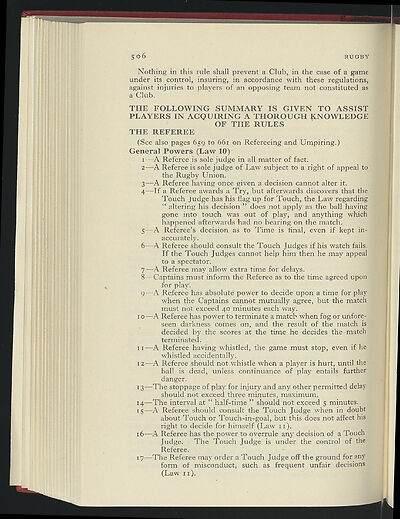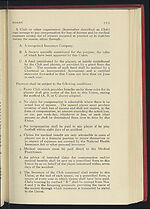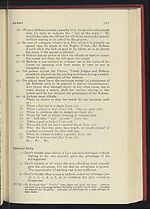1950-51
(532)
Download files
Complete book:
Individual page:
Thumbnail gallery: Grid view | List view

506
RUGBY
Nothing in this rule shall prevent a Club, in the case of a game
under its control, insuring, in accordance with these regulations,
against injuries to players of an opposing team not constituted as
a Club.
THE FOLLOWING SUMMARY IS GIVEN TO ASSIST
PLAYERS IN ACQUIRING A THOROUGH KNOWLEDGE
OF THE RULES
THE REFEREE
(See also pages 659 to 661 on Refereeing and Umpiring.)
General Powers (Law 10)
1
—A Referee is sole judge in all matter of fact.
2
—A Referee is sole judge of Law subject to a right of appeal to
the Rugby Union.
3—A Referee having once given a decision cannot alter it.
4—Tf a Referee awards a Try, but afterwards discovers that the
Touch judge has his flag up for Touch, the Law regarding
" altering his decision " does not apply as the ball having
gone into touch was out of play, and anything which
happened afterwards had no bearing on the match.
5—A Referee's decision as to Time is final, even if kept in-
accurately.
6—A Referee should consult the Touch Judges if his watch fails.
If the Touch Judges cannot help him then he may appeal
to a spectator.
7 —A Referee may allow extra time for delays.
8—Captains must inform the Referee as to the time ,agreed upon
for play.
9—A Referee has absolute power to decide upon a time for play
when the Captains cannot mutually agree, but the match
must not exceed
40
minutes each way.
1
o—A Referee has power to terminate a matcl- when fog or unfore-
seen darkness comes on, and the result of the match is
decided by the scores at the time he decides the match
terminated.
i 1
—A Referee having whistled, the game must stop, even if he
whistled accidentally.
12
—A Referee should not whistle when a player is hurt, until the
ball is dead, unless continuance of play entails further
danger.
13—The stoppage of play for injury and any other permitted delay
should not exceed three minutes, maximum.
14—The interval at " half-time " should not exceed 5 minutes.
15—A Referee should consult the Touch Judge when in doubt
about Touch or Touch-in-goal, but this does not affect his
right to decide for himself (Law
1 i ).
16—A Referee has the power to overrule any decision of a Touch
Judge. The Touch Judge is under the control of the
Referee.
17—The Referee may order a Touch Judge off the ground for any
form of misconduct, such as frequent unfair decisions
(Law
11).
RUGBY
Nothing in this rule shall prevent a Club, in the case of a game
under its control, insuring, in accordance with these regulations,
against injuries to players of an opposing team not constituted as
a Club.
THE FOLLOWING SUMMARY IS GIVEN TO ASSIST
PLAYERS IN ACQUIRING A THOROUGH KNOWLEDGE
OF THE RULES
THE REFEREE
(See also pages 659 to 661 on Refereeing and Umpiring.)
General Powers (Law 10)
1
—A Referee is sole judge in all matter of fact.
2
—A Referee is sole judge of Law subject to a right of appeal to
the Rugby Union.
3—A Referee having once given a decision cannot alter it.
4—Tf a Referee awards a Try, but afterwards discovers that the
Touch judge has his flag up for Touch, the Law regarding
" altering his decision " does not apply as the ball having
gone into touch was out of play, and anything which
happened afterwards had no bearing on the match.
5—A Referee's decision as to Time is final, even if kept in-
accurately.
6—A Referee should consult the Touch Judges if his watch fails.
If the Touch Judges cannot help him then he may appeal
to a spectator.
7 —A Referee may allow extra time for delays.
8—Captains must inform the Referee as to the time ,agreed upon
for play.
9—A Referee has absolute power to decide upon a time for play
when the Captains cannot mutually agree, but the match
must not exceed
40
minutes each way.
1
o—A Referee has power to terminate a matcl- when fog or unfore-
seen darkness comes on, and the result of the match is
decided by the scores at the time he decides the match
terminated.
i 1
—A Referee having whistled, the game must stop, even if he
whistled accidentally.
12
—A Referee should not whistle when a player is hurt, until the
ball is dead, unless continuance of play entails further
danger.
13—The stoppage of play for injury and any other permitted delay
should not exceed three minutes, maximum.
14—The interval at " half-time " should not exceed 5 minutes.
15—A Referee should consult the Touch Judge when in doubt
about Touch or Touch-in-goal, but this does not affect his
right to decide for himself (Law
1 i ).
16—A Referee has the power to overrule any decision of a Touch
Judge. The Touch Judge is under the control of the
Referee.
17—The Referee may order a Touch Judge off the ground for any
form of misconduct, such as frequent unfair decisions
(Law
11).
Set display mode to:
![]() Universal Viewer |
Universal Viewer | ![]() Mirador |
Large image | Transcription
Mirador |
Large image | Transcription
| Games and sports in the army > 1950-51 > (532) |
|---|
| Permanent URL | https://digital.nls.uk/248814404 |
|---|
| Description | 'Games and Sports in the Army' was an annual publication produced by the British War Office between the 1930s and 1960s. This included the Second World War. It outlines the rules and regulations for games and sports played by members of the armed forces. It features names and photographs of team members, and examples of contemporary advertising. |
|---|---|
| Shelfmark | GWB.52 |

